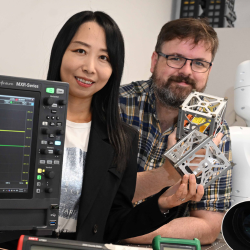-
Study
-
Undergraduate
- Search for a Course
- Undergraduate Open Day & Events
- Application Guides
- Northumbria University UCAS Exhibitions
- Foundation Years
- Undergraduate Fees & Funding
- School & College Outreach
- Continuing Professional Development
-
Postgraduate
- Postgraduate Study Degree
- Postgraduate Research Degrees
- Postgraduate Open Days and Events
- Postgraduate Fees & Funding
- Flexible Learning
- Thinking about a Masters?
- Continuing Professional Development
- Change Direction
-
Student Life
- The Hub - Student Blog
- Accommodation
- Life in Newcastle
- Support for Students
- Careers
- Information for Parents
- Students' Union
- Northumbria Sport
- Be Part of It
-
-
International
International
Northumbria’s global footprint touches every continent across the world, through our global partnerships across 17 institutions in 10 countries, to our 277,000 strong alumni community and 150 recruitment partners – we prepare our students for the challenges of tomorrow. Discover more about how to join Northumbria’s global family or our partnerships.
View our Global Footprint-
Applying to Northumbria
- European Union
- Our London Campus
- Northumbria Pathway
- International Events
- Entry Requirements and Country Representatives
- Regional Offices
-
Northumbria Language Centre
- Faculty Requirements
- Acceptable English Requirements
- Pre-sessional English Language and Study Skills
- Academic Language Skills Programmes (ALS)
-
International Fees, Funding & Scholarships
- International Undergraduate Fees
- International Undergraduate Funding
- International Masters Fees
- International Masters Funding
- International Postgraduate Research Fees
- International Postgraduate Research Funding
- International Money Matters
-
Life at Northumbria
- International student support
- Careers
-
International Mobility
- Current Northumbria Students
- Incoming Exchange Students
-
-
Business
Business
The world is changing faster than ever before. The future is there to be won by organisations who find ways to turn today's possibilities into tomorrows competitive edge. In a connected world, collaboration can be the key to success.
More on our Business Services -
Research
Research
Northumbria is a research-rich, business-focused, professional university with a global reputation for academic quality. We conduct ground-breaking research that is responsive to the science & technology, health & well being, economic and social and arts & cultural needs for the communities
Discover more about our Research -
About Us
-
About Northumbria
- Our Strategy
- Our Staff
- Place and Partnerships
- Student Profiles
- Alumni Profiles
- Leadership & Governance
- Academic Departments
- University Services
- History of Northumbria
- Contact us
- Online Shop
-
-
Alumni
Alumni
Northumbria University is renowned for the calibre of its business-ready graduates. Our alumni network has over 244,000 graduates based in 178 countries worldwide in a range of sectors, our alumni are making a real impact on the world.
Our Alumni - Work For Us
What will I learn on this module?
This module focuses on ways to conduct independent research, together with the key academic skills of analysis, synthesis and criticality. You will be able to learn about processes and practices of conducting research from the initial idea to reporting results as well as understand the purpose of the research projects. The module examines the principles of research design before progressing to a more detailed treatment of data collection and analysis. You will be challenged to develop research ideas and critique existing literature primarily from academic sources. You will gain an understanding of various means of undertaking a research enquiry specifically to provide insights to solving a relevant problem, including activities as defining hypothesis/research questions, designing research objectives and research design that involves also budgetary limitations, primary and secondary data collection, research methods, and structuring of the final results.
How will I learn on this module?
You will be supported by a Teaching and Learning Plan (TLP) which outlines the contact time in facilitated sessions (lectures, seminars) and provides details of tutor-directed and independent study/learning. Module materials will be made available to you through an e-learning portal.
Key concepts and theories will be introduced in one-hour lectures and supported throughout with contemporary examples and case studies. Lectures will provide key explanations of theoretical issues.
Lectures will be supported by two-hour seminars that will involve discussing case studies in teams of maximum four students to foster teamwork and to increase students’ intercultural awareness.
The aim of the sessions will be to introduce the core principles of conducting research in business and in an academic context as preparation for your final year of undergraduate studies. This will be aided by the extensive use of case studies and examples to ensure you can see how this knowledge can be applied.
Directed learning will focus on pre-reading, activity-based learning through specially designed exercises, and the use of the e-Learning Portal (eLP). Independent learning will be based upon your own initiative in further exploring and researching areas of interest.
How will I be supported academically on this module?
Support will be provided to you by a member of academic staff leading the module and the teaching team delivering lectures/seminars. The teaching team are allocated seminars in IT Labs of groups of maximum 20 students, which provides a closer, more personal academic support. These seminar groups are typically based on study programme cohorts, so you will be taught here alongside fellow members from your particular degree.
Your module is supported by an e-learning portal, which houses lecture materials, seminars, case studies and assessment details. Additionally, assessments will be submitted and marked through an electronic assessment platform on the e-learning portal.
You will also be provided a wide-ranging electronic reading list that comprises of various books, conference papers and journal articles relevant to the material covered by the module.
There are two components to the assessment for this module. The first is a group presentation, while the second is a written assessment. The group presentation is worth 30% of the marks for this module, while the individual report is worth 70%.
What will I be expected to read on this module?
All modules at Northumbria include a range of reading materials that students are expected to engage with. Online reading lists (provided after enrolment) give you access to your reading material for your modules. The Library works in partnership with your module tutors to ensure you have access to the material that you need.
What will I be expected to achieve?
Knowledge & Understanding:
• You will demonstrate knowledge and some evidence of critical understanding of underlying concepts and principles associated with business research. (MLO1)
• You will demonstrate an awareness of the limitations of your knowledge and how these limitations influence your analyses and interpretations based on that knowledge. (MLO2)
Intellectual / Professional skills & abilities:
• You will demonstrate the ability to produce a research proposal informed by knowledge of the main methods of enquiry into business related issues/projects. (MLO3)
Personal Values Attributes (Global / Cultural awareness, Ethics, Curiosity) (PVA):
• You will demonstrate awareness of the cultural and ethical context. (MLO4)
How will I be assessed?
1. Group presentation – 30%
10-minute group presentation (up to 4 students).
Assesses MLO1, MLO2 and MLO4.
2. Research proposal – 70%
1500 word research proposal, assesses MLO1, MLO2 and MLO3
Pre-requisite(s)
N/A
Co-requisite(s)
N/A
Module abstract
In this module you’ll acquire the necessary academic skills and expertise to successfully address a research problem and, using this understanding,
develop and use an actionable research proposal. This will ensure you’re prepared for Level 6. By undertaking this module, you’ll become aware of those
skills that are transferable to business contexts and the purpose of research in a business context. You’ll be able to prepare an undergraduate research
proposal based on the analysis of organisational issues and practices. The module will also enable you to analyse, synthesise and criticise data effectively
and equip you with advanced skills in academic and business writing, and oral communication skills.
Course info
UCAS Code N185
Credits 20
Level of Study Undergraduate
Mode of Study 4 years Full Time with a Placement (Sandwich)/Study Abroad
Department Newcastle Business School
Location City Campus, Northumbria University
City Newcastle
Start September 2025
All information is accurate at the time of sharing.
Full time Courses are primarily delivered via on-campus face to face learning but could include elements of online learning. Most courses run as planned and as promoted on our website and via our marketing materials, but if there are any substantial changes (as determined by the Competition and Markets Authority) to a course or there is the potential that course may be withdrawn, we will notify all affected applicants as soon as possible with advice and guidance regarding their options. It is also important to be aware that optional modules listed on course pages may be subject to change depending on uptake numbers each year.
Contact time is subject to increase or decrease in line with possible restrictions imposed by the government or the University in the interest of maintaining the health and safety and wellbeing of students, staff, and visitors if this is deemed necessary in future.
Useful Links
Find out about our distinctive approach at
www.northumbria.ac.uk/exp
Admissions Terms and Conditions
northumbria.ac.uk/terms
Fees and Funding
northumbria.ac.uk/fees
Admissions Policy
northumbria.ac.uk/adpolicy
Admissions Complaints Policy
northumbria.ac.uk/complaints














